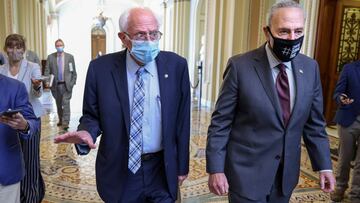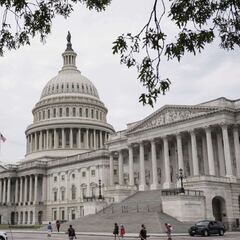Bipartisan infrastructure bill gains enough votes to pass in US Senate
President Joe Biden's $1 trillion infrastructure package secured enough votes to pass the Senate on Tuesday, voting 69-30 in favour.

A $1 trillion infrastructure package that is a top priority for US President Joe Biden secured enough votes to pass the Senate on Tuesday, a victory for the White House and the bipartisan group of senators who spent months negotiating it. Voting ended 69-30 in favour in the 100-seat chamber. Senate Majority Leader Chuck Schumer hailed the new bill as "the most robust injection of funds into infrastructure in decades".
What is in the new infrastructure package?
Unemployment benefits: will Biden extend the federal payment?
Fourth stimulus check: will petitions have an effect on decision-making?
Eviction moratorium extended: what's the new date and how many people will benefit?
Opposition for Budget Plan bill
Biden hopes that the infrastructure bill will spur years of investments in roads, bridges, waterways and improved internet access. Polls show that the drive to upgrade America's infrastructure, which is the product of months of negotiations between the White House and a bipartisan group of senators, is broadly popular with the public. But debate will now quickly move on to another $3.5 trillion Budget Plan bill, which addresses climate change and boosts social spending but is resoundingly opposed by Republicans.
House of Representatives Speaker Nancy Pelosi has said her chamber will not take up the $1 trillion bill until it also receives the larger plan, which is not likely before late September.
The Senate just took a first step to address our nation’s crumbling infrastructure. But our work isn't done. We need universal child care, clean energy investments & more. We pay for it by making the wealthy & corporations pay their fair share. Let’s get it done.
— Elizabeth Warren (@SenWarren) August 10, 2021
After working for two consecutive weekends on the infrastructure bill, an around-the-clock 'vote-a-rama' session could be in store for the Senate starting Tuesday afternoon as it kicks off debate on the larger budget plan. Senate Minority Leader Mitch McConnell signaled that Republicans would try to use the vote-a-rama to pick off support from moderate Democrats for what he called a "radical" spending package that would create a permanent welfare state and usher in the largest peacetime tax hike in US history.
Some of the proposals included in the $3.5 trillion Budget Plan bill include $726 billion to be used to provide universal preschool for all 3- and 4-year-olds, two years of tuition-free community college and child care for working families. A further $332 billion would be destined to creating and preserving affordable housing in cities, suburbs and rural areas. $198 billion would go to the Committee on Energy and Natural Resources, to offer direct payments to utilities for hitting clean energy goals, consumer rebates to make homes more energy efficient and financing for domestic manufacturing of clean energy and auto supply chain technologies. The Committee on Environment and Public Works would receive $67 billion to fund a Clean Energy Technology Accelerator that would fund affordable and other climate-friendly technologies, investments in clean drinking water and imposing fees on emitters of methane to reduce carbon emissions.
Related stories
Democratic Senator Gary Peters, who represents the auto-manufacturing state of Michigan, said during Monday's debate: "Not only will this set us on a path to a more sustainable future, it helps grow America's domestic manufacturing sector." However, many Republicans have dismissed the Democrats' budget plan as a 'socialist' waste of money and will oppose it. Senate Republican Leader Mitch McConnell branded it "a reckless spending spree".
Senate Democrats are about to take their first step toward yet another reckless, partisan taxing and spending spree.
— Leader McConnell (@LeaderMcConnell) August 10, 2021
It will push costs even higher for families. It will shatter President Biden’s promise of no middle-class tax hikes.
Long day of debate and voting ahead.
Republican opposition
Senate passage of the infrastructure bill and the budget plan would clear the way for it to begin a month-long summer break. When Congress returns in September, it will not only debate the large investment measures but have to fund government activities for the fiscal year beginning on 1 October, increase Washington's borrowing authority and possibly try to pass a voting reform bill.

